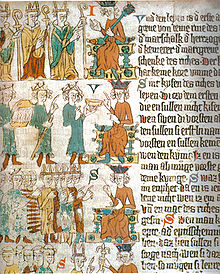

The Sachsenspiegel (German: [ˈzaksn̩ˌʃpiːɡl̩] ; Middle Low German: Sassen Speyghel; modern Low German: Sassenspegel; all literally "Saxon Mirror") is one of the most important law books and custumals compiled during the Holy Roman Empire. Originating between 1220 and 1235 as a record of existing local traditional customary laws and rulings, it was used in places until as late as 1900. Some legal principles as captured in the book reign into recent time laws throughout Europe. It is important not only for its lasting effect on later German and Dutch law but also as an early example of written prose in a Low German language.[1] The Sachsenspiegel is the first comprehensive law book not in Latin, but in Middle Low German. A Latin edition is known to have existed, but only fragmented chapters remain.
- ^ Dieter Pötschke (2002). "Utgetogen Recht steiht hir. Brandenburgische Stadt- und Landrechte im Mittelalter". In Dieter Pötschke (ed.). Stadtrecht, Roland und Pranger: zur Rechtsgeschichte von Halberstadt, Goslar, Bremen und Städten der Mark Brandenburg [Stadtrecht, Roland und Pranger: zur Rechtsgeschichte von Halberstadt, Goslar, Bremen und Städten der Mark Brandenburg]. Harz-Forschungen (in German). Vol. 15. Lukas. p. 135. ISBN 3-931836-77-0.
Mit dem Sachsenspiegel] schuf Eike von Repchow nicht nur eines der ersten deutschen Rechtsbücher neben dem Mühlhäuser Rechtsbuch nach des Reiches Recht, sondern das erste deutsche Prosawerk überhaupt.